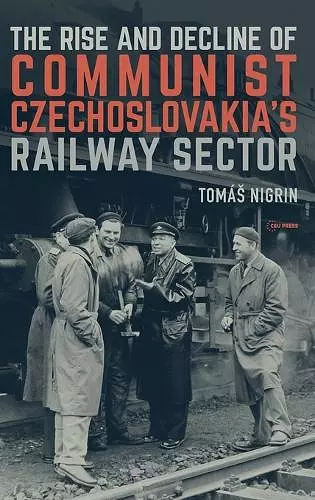The Rise and Decline of Communist Czechoslovakia´s Railway Sector
Format:Hardback
Publisher:Central European University Press
Published:10th Jul '22
Should be back in stock very soon

Once the pride of interwar Czechoslovakia, and key during the forced industrialization of the Stalinist period, during the 1970s and 1980s the Czechoslovak railway sector showed the symptoms of the political tiredness and economic exhaustion of the Soviet Bloc. This book examines the failure of central economic planning through the lens of this national transport system.
Based on the presentation of its history and on the detailed scrutiny of the actors, institutions, internal mechanisms, and conditions of the railway sector, the analysis reveals the identities of the real stakeholders in the state administration. This case shows how the country was governed by Communist Party institutions and government ministries, and how developments in the transportation sector—like in every sector—reflected their priorities. Numerous tables with selected statistics underscore the economic analysis and black and white photos offer a glimpse on the technical base of the railway sector.
The book is filled with enlightening comparisons of the Czechoslovak transportation industry with its counterparts in the whole Eastern Bloc. Integration into the Council for Mutual Economic Assistance (Comecon) of the Bloc could have been an asset, yet the records have more to say about conflicts than cooperation.
"Tomáš Nigrin's book is a valuable contribution to the history of Czechoslovak and European railways and the history of transportation in the second half of the twentieth century. He analyzes previously unpublished sources and puts the whole problem in a broader European context." https://muse.jhu.edu/article/903993 -- Michal Ďurčo * Technology and Culture *
"This book serves as a detailed case study of the railroads’ place in a planned economy and presents a clear example of the inefficiencies of central planning, making it a useful resource for those interested in the economic history of communist states. It often applies the logic of the market to an economic system that operated according to different principles. While the ČSD consistently failed to meet its own standards of service and reliability in the 1970s and 1980s, it also could pull off highly complex logistical tasks when politically necessary, as Nigrin demonstrates with his discussion of the railroads’ elaborate preparations for transporting participants and spectators to the Spartakiad gymnastics exhibitions." https://www.h-net.org/reviews/showrev.php -- Mira Markham * H-Sci-Med-Tech *
"The main contribution of the work is a thorough and in-depth analysis of the historical, economic, and political contexts of the development of socialist railways in Czechoslovakia. It presents a unique probe into the workings of this sector and enables an understanding of the historical development of the railway in the context of the political and economic development of communist Czechoslovakia." https://www.cambridge.org/core/journals/austrian-history-yearbook/article/tomas-nigrin-the-rise-and-decline-of-communist-czechoslovakias-railway-sector-budapest-central-european-university-press-2022-pp-256/68577F0C47B2A866D655F4887DF4C28E -- Zdeněk Tomeš * Austrian History Yearbook *
"The study is a rewarding read for its details on institutions and economic practice in Communist Czechoslovakia. It charts the stagnation of a key sector of the economy and society in a system bound to an inflexible plan and under a government that clearly feared the power of its citizens." -- Felix Jeschke * Bohemia *
ISBN: 9789633864760
Dimensions: unknown
Weight: unknown
256 pages